Principles of Ethical Theories: A Computer Ethics Overview
VerifiedAdded on 2019/09/30
|10
|4219
|177
Homework Assignment
AI Summary
This assignment provides an introduction to ethical theories, exploring the concepts of ethics, character, and the distinction between right and wrong. It delves into the application of these theories within the context of computer ethics. The assignment begins by addressing the importance of ethical behavior and its role in fostering trust and productive relationships. It then introduces fundamental ethical theories, including teleology (consequentialism) and deontology, providing definitions and examples of each. Teleological theories, such as utilitarianism, ethical egoism, and the common good approach, are discussed in terms of their focus on maximizing the good outcomes of actions. Deontological theories, which emphasize duties and rights irrespective of outcomes, are also examined. The document highlights the relevance of ethical theories in the IT field, emphasizing the responsibilities of IT professionals in handling data privacy, accuracy, and integrity. It underscores the need for ethical guidelines in navigating the challenges posed by technological advancements.
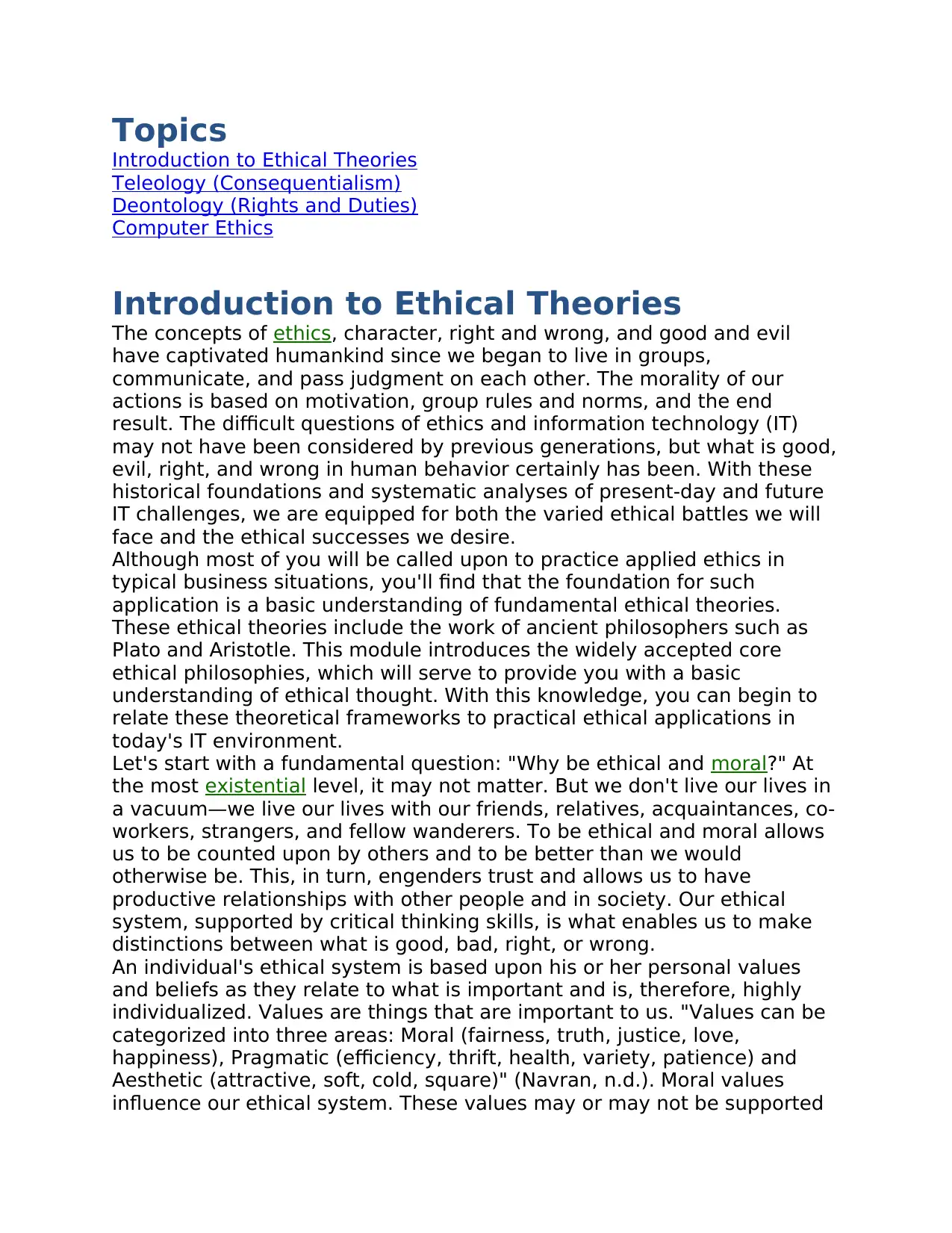
Topics
Introduction to Ethical Theories
Teleology (Consequentialism)
Deontology (Rights and Duties)
Computer Ethics
Introduction to Ethical Theories
The concepts of ethics, character, right and wrong, and good and evil
have captivated humankind since we began to live in groups,
communicate, and pass judgment on each other. The morality of our
actions is based on motivation, group rules and norms, and the end
result. The difficult questions of ethics and information technology (IT)
may not have been considered by previous generations, but what is good,
evil, right, and wrong in human behavior certainly has been. With these
historical foundations and systematic analyses of present-day and future
IT challenges, we are equipped for both the varied ethical battles we will
face and the ethical successes we desire.
Although most of you will be called upon to practice applied ethics in
typical business situations, you'll find that the foundation for such
application is a basic understanding of fundamental ethical theories.
These ethical theories include the work of ancient philosophers such as
Plato and Aristotle. This module introduces the widely accepted core
ethical philosophies, which will serve to provide you with a basic
understanding of ethical thought. With this knowledge, you can begin to
relate these theoretical frameworks to practical ethical applications in
today's IT environment.
Let's start with a fundamental question: "Why be ethical and moral?" At
the most existential level, it may not matter. But we don't live our lives in
a vacuum—we live our lives with our friends, relatives, acquaintances, co-
workers, strangers, and fellow wanderers. To be ethical and moral allows
us to be counted upon by others and to be better than we would
otherwise be. This, in turn, engenders trust and allows us to have
productive relationships with other people and in society. Our ethical
system, supported by critical thinking skills, is what enables us to make
distinctions between what is good, bad, right, or wrong.
An individual's ethical system is based upon his or her personal values
and beliefs as they relate to what is important and is, therefore, highly
individualized. Values are things that are important to us. "Values can be
categorized into three areas: Moral (fairness, truth, justice, love,
happiness), Pragmatic (efficiency, thrift, health, variety, patience) and
Aesthetic (attractive, soft, cold, square)" (Navran, n.d.). Moral values
influence our ethical system. These values may or may not be supported
Introduction to Ethical Theories
Teleology (Consequentialism)
Deontology (Rights and Duties)
Computer Ethics
Introduction to Ethical Theories
The concepts of ethics, character, right and wrong, and good and evil
have captivated humankind since we began to live in groups,
communicate, and pass judgment on each other. The morality of our
actions is based on motivation, group rules and norms, and the end
result. The difficult questions of ethics and information technology (IT)
may not have been considered by previous generations, but what is good,
evil, right, and wrong in human behavior certainly has been. With these
historical foundations and systematic analyses of present-day and future
IT challenges, we are equipped for both the varied ethical battles we will
face and the ethical successes we desire.
Although most of you will be called upon to practice applied ethics in
typical business situations, you'll find that the foundation for such
application is a basic understanding of fundamental ethical theories.
These ethical theories include the work of ancient philosophers such as
Plato and Aristotle. This module introduces the widely accepted core
ethical philosophies, which will serve to provide you with a basic
understanding of ethical thought. With this knowledge, you can begin to
relate these theoretical frameworks to practical ethical applications in
today's IT environment.
Let's start with a fundamental question: "Why be ethical and moral?" At
the most existential level, it may not matter. But we don't live our lives in
a vacuum—we live our lives with our friends, relatives, acquaintances, co-
workers, strangers, and fellow wanderers. To be ethical and moral allows
us to be counted upon by others and to be better than we would
otherwise be. This, in turn, engenders trust and allows us to have
productive relationships with other people and in society. Our ethical
system, supported by critical thinking skills, is what enables us to make
distinctions between what is good, bad, right, or wrong.
An individual's ethical system is based upon his or her personal values
and beliefs as they relate to what is important and is, therefore, highly
individualized. Values are things that are important to us. "Values can be
categorized into three areas: Moral (fairness, truth, justice, love,
happiness), Pragmatic (efficiency, thrift, health, variety, patience) and
Aesthetic (attractive, soft, cold, square)" (Navran, n.d.). Moral values
influence our ethical system. These values may or may not be supported
Paraphrase This Document
Need a fresh take? Get an instant paraphrase of this document with our AI Paraphraser
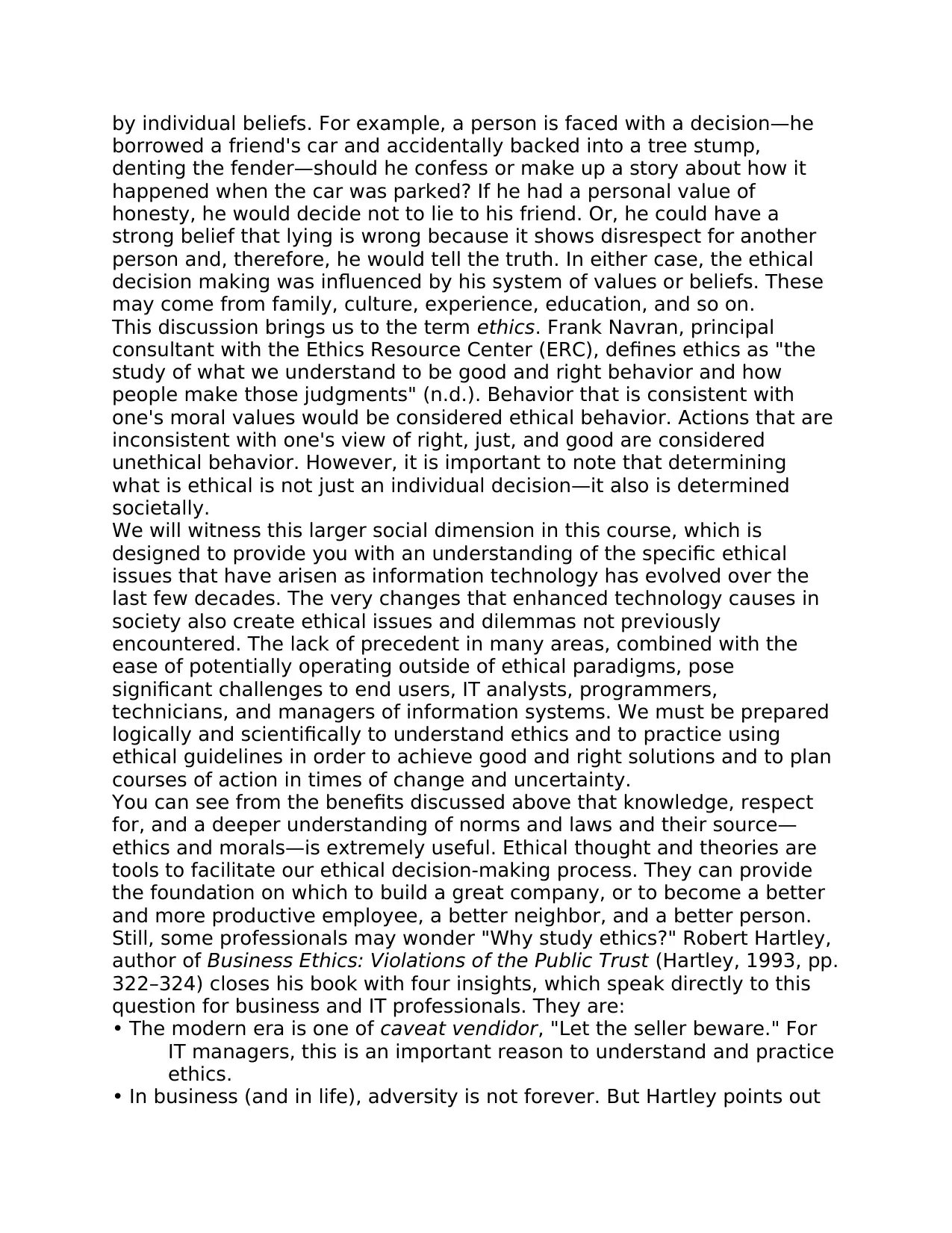
by individual beliefs. For example, a person is faced with a decision—he
borrowed a friend's car and accidentally backed into a tree stump,
denting the fender—should he confess or make up a story about how it
happened when the car was parked? If he had a personal value of
honesty, he would decide not to lie to his friend. Or, he could have a
strong belief that lying is wrong because it shows disrespect for another
person and, therefore, he would tell the truth. In either case, the ethical
decision making was influenced by his system of values or beliefs. These
may come from family, culture, experience, education, and so on.
This discussion brings us to the term ethics. Frank Navran, principal
consultant with the Ethics Resource Center (ERC), defines ethics as "the
study of what we understand to be good and right behavior and how
people make those judgments" (n.d.). Behavior that is consistent with
one's moral values would be considered ethical behavior. Actions that are
inconsistent with one's view of right, just, and good are considered
unethical behavior. However, it is important to note that determining
what is ethical is not just an individual decision—it also is determined
societally.
We will witness this larger social dimension in this course, which is
designed to provide you with an understanding of the specific ethical
issues that have arisen as information technology has evolved over the
last few decades. The very changes that enhanced technology causes in
society also create ethical issues and dilemmas not previously
encountered. The lack of precedent in many areas, combined with the
ease of potentially operating outside of ethical paradigms, pose
significant challenges to end users, IT analysts, programmers,
technicians, and managers of information systems. We must be prepared
logically and scientifically to understand ethics and to practice using
ethical guidelines in order to achieve good and right solutions and to plan
courses of action in times of change and uncertainty.
You can see from the benefits discussed above that knowledge, respect
for, and a deeper understanding of norms and laws and their source—
ethics and morals—is extremely useful. Ethical thought and theories are
tools to facilitate our ethical decision-making process. They can provide
the foundation on which to build a great company, or to become a better
and more productive employee, a better neighbor, and a better person.
Still, some professionals may wonder "Why study ethics?" Robert Hartley,
author of Business Ethics: Violations of the Public Trust (Hartley, 1993, pp.
322–324) closes his book with four insights, which speak directly to this
question for business and IT professionals. They are:
• The modern era is one of caveat vendidor, "Let the seller beware." For
IT managers, this is an important reason to understand and practice
ethics.
• In business (and in life), adversity is not forever. But Hartley points out
borrowed a friend's car and accidentally backed into a tree stump,
denting the fender—should he confess or make up a story about how it
happened when the car was parked? If he had a personal value of
honesty, he would decide not to lie to his friend. Or, he could have a
strong belief that lying is wrong because it shows disrespect for another
person and, therefore, he would tell the truth. In either case, the ethical
decision making was influenced by his system of values or beliefs. These
may come from family, culture, experience, education, and so on.
This discussion brings us to the term ethics. Frank Navran, principal
consultant with the Ethics Resource Center (ERC), defines ethics as "the
study of what we understand to be good and right behavior and how
people make those judgments" (n.d.). Behavior that is consistent with
one's moral values would be considered ethical behavior. Actions that are
inconsistent with one's view of right, just, and good are considered
unethical behavior. However, it is important to note that determining
what is ethical is not just an individual decision—it also is determined
societally.
We will witness this larger social dimension in this course, which is
designed to provide you with an understanding of the specific ethical
issues that have arisen as information technology has evolved over the
last few decades. The very changes that enhanced technology causes in
society also create ethical issues and dilemmas not previously
encountered. The lack of precedent in many areas, combined with the
ease of potentially operating outside of ethical paradigms, pose
significant challenges to end users, IT analysts, programmers,
technicians, and managers of information systems. We must be prepared
logically and scientifically to understand ethics and to practice using
ethical guidelines in order to achieve good and right solutions and to plan
courses of action in times of change and uncertainty.
You can see from the benefits discussed above that knowledge, respect
for, and a deeper understanding of norms and laws and their source—
ethics and morals—is extremely useful. Ethical thought and theories are
tools to facilitate our ethical decision-making process. They can provide
the foundation on which to build a great company, or to become a better
and more productive employee, a better neighbor, and a better person.
Still, some professionals may wonder "Why study ethics?" Robert Hartley,
author of Business Ethics: Violations of the Public Trust (Hartley, 1993, pp.
322–324) closes his book with four insights, which speak directly to this
question for business and IT professionals. They are:
• The modern era is one of caveat vendidor, "Let the seller beware." For
IT managers, this is an important reason to understand and practice
ethics.
• In business (and in life), adversity is not forever. But Hartley points out
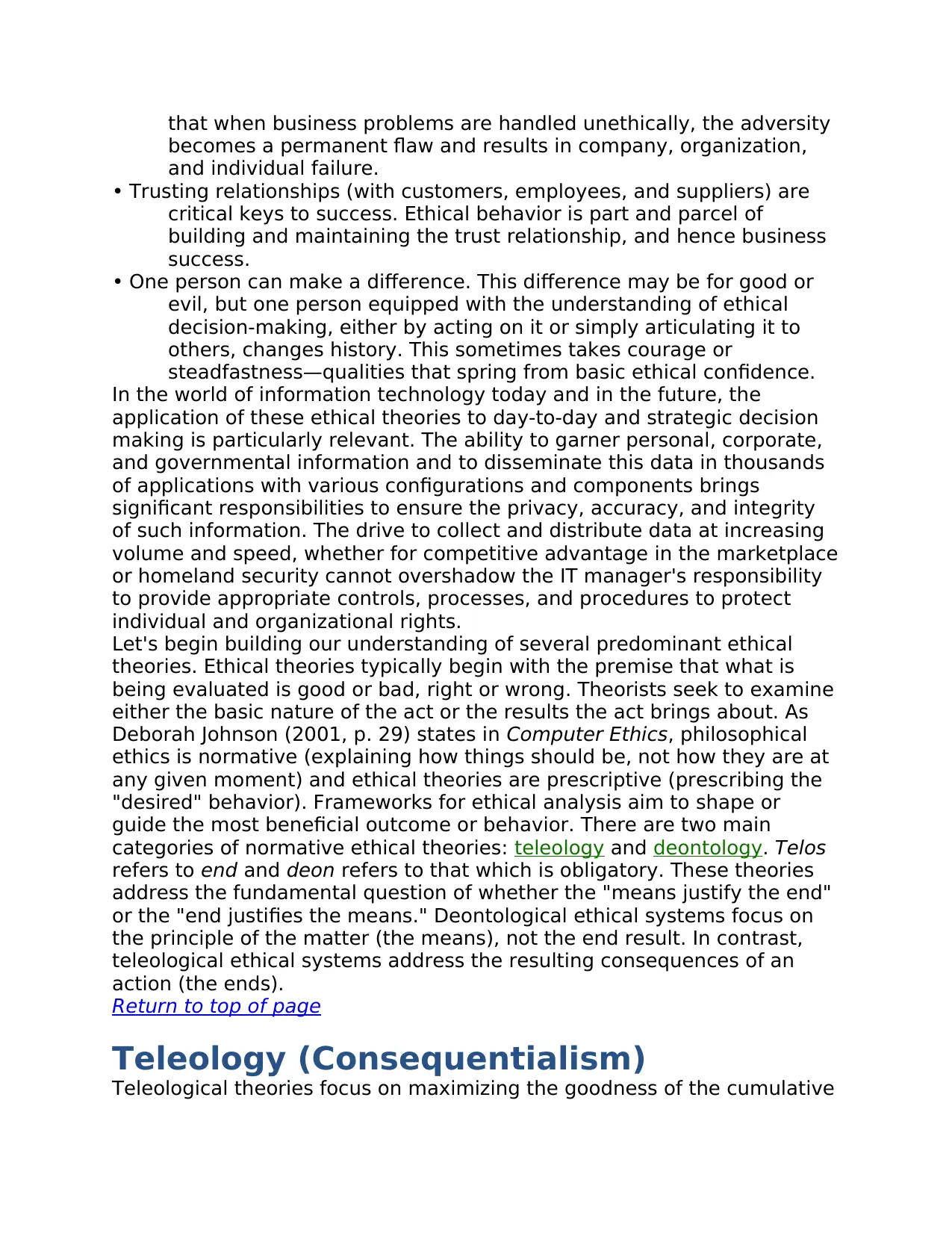
that when business problems are handled unethically, the adversity
becomes a permanent flaw and results in company, organization,
and individual failure.
• Trusting relationships (with customers, employees, and suppliers) are
critical keys to success. Ethical behavior is part and parcel of
building and maintaining the trust relationship, and hence business
success.
• One person can make a difference. This difference may be for good or
evil, but one person equipped with the understanding of ethical
decision-making, either by acting on it or simply articulating it to
others, changes history. This sometimes takes courage or
steadfastness—qualities that spring from basic ethical confidence.
In the world of information technology today and in the future, the
application of these ethical theories to day-to-day and strategic decision
making is particularly relevant. The ability to garner personal, corporate,
and governmental information and to disseminate this data in thousands
of applications with various configurations and components brings
significant responsibilities to ensure the privacy, accuracy, and integrity
of such information. The drive to collect and distribute data at increasing
volume and speed, whether for competitive advantage in the marketplace
or homeland security cannot overshadow the IT manager's responsibility
to provide appropriate controls, processes, and procedures to protect
individual and organizational rights.
Let's begin building our understanding of several predominant ethical
theories. Ethical theories typically begin with the premise that what is
being evaluated is good or bad, right or wrong. Theorists seek to examine
either the basic nature of the act or the results the act brings about. As
Deborah Johnson (2001, p. 29) states in Computer Ethics, philosophical
ethics is normative (explaining how things should be, not how they are at
any given moment) and ethical theories are prescriptive (prescribing the
"desired" behavior). Frameworks for ethical analysis aim to shape or
guide the most beneficial outcome or behavior. There are two main
categories of normative ethical theories: teleology and deontology. Telos
refers to end and deon refers to that which is obligatory. These theories
address the fundamental question of whether the "means justify the end"
or the "end justifies the means." Deontological ethical systems focus on
the principle of the matter (the means), not the end result. In contrast,
teleological ethical systems address the resulting consequences of an
action (the ends).
Return to top of page
Teleology (Consequentialism)
Teleological theories focus on maximizing the goodness of the cumulative
becomes a permanent flaw and results in company, organization,
and individual failure.
• Trusting relationships (with customers, employees, and suppliers) are
critical keys to success. Ethical behavior is part and parcel of
building and maintaining the trust relationship, and hence business
success.
• One person can make a difference. This difference may be for good or
evil, but one person equipped with the understanding of ethical
decision-making, either by acting on it or simply articulating it to
others, changes history. This sometimes takes courage or
steadfastness—qualities that spring from basic ethical confidence.
In the world of information technology today and in the future, the
application of these ethical theories to day-to-day and strategic decision
making is particularly relevant. The ability to garner personal, corporate,
and governmental information and to disseminate this data in thousands
of applications with various configurations and components brings
significant responsibilities to ensure the privacy, accuracy, and integrity
of such information. The drive to collect and distribute data at increasing
volume and speed, whether for competitive advantage in the marketplace
or homeland security cannot overshadow the IT manager's responsibility
to provide appropriate controls, processes, and procedures to protect
individual and organizational rights.
Let's begin building our understanding of several predominant ethical
theories. Ethical theories typically begin with the premise that what is
being evaluated is good or bad, right or wrong. Theorists seek to examine
either the basic nature of the act or the results the act brings about. As
Deborah Johnson (2001, p. 29) states in Computer Ethics, philosophical
ethics is normative (explaining how things should be, not how they are at
any given moment) and ethical theories are prescriptive (prescribing the
"desired" behavior). Frameworks for ethical analysis aim to shape or
guide the most beneficial outcome or behavior. There are two main
categories of normative ethical theories: teleology and deontology. Telos
refers to end and deon refers to that which is obligatory. These theories
address the fundamental question of whether the "means justify the end"
or the "end justifies the means." Deontological ethical systems focus on
the principle of the matter (the means), not the end result. In contrast,
teleological ethical systems address the resulting consequences of an
action (the ends).
Return to top of page
Teleology (Consequentialism)
Teleological theories focus on maximizing the goodness of the cumulative
⊘ This is a preview!⊘
Do you want full access?
Subscribe today to unlock all pages.

Trusted by 1+ million students worldwide
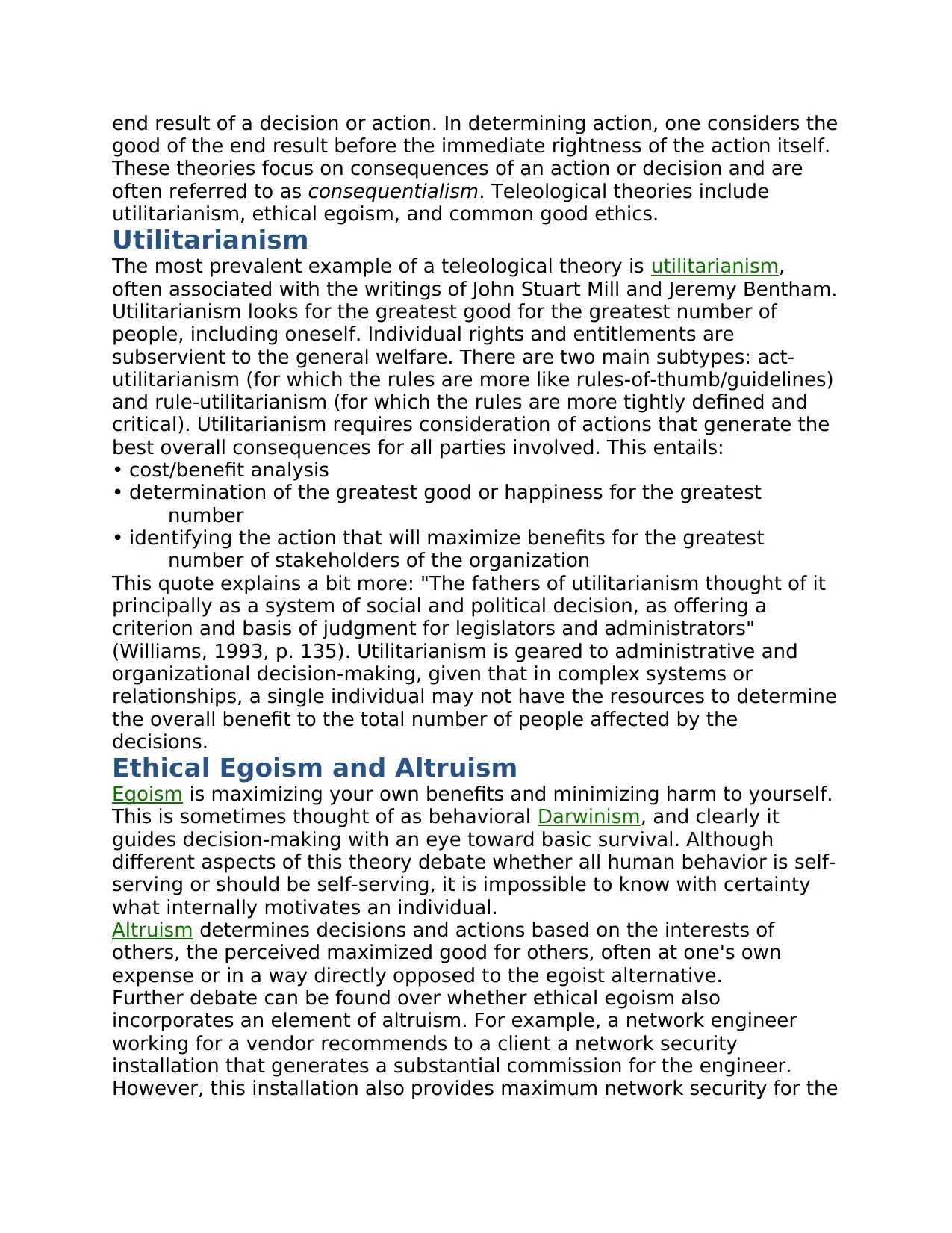
end result of a decision or action. In determining action, one considers the
good of the end result before the immediate rightness of the action itself.
These theories focus on consequences of an action or decision and are
often referred to as consequentialism. Teleological theories include
utilitarianism, ethical egoism, and common good ethics.
Utilitarianism
The most prevalent example of a teleological theory is utilitarianism,
often associated with the writings of John Stuart Mill and Jeremy Bentham.
Utilitarianism looks for the greatest good for the greatest number of
people, including oneself. Individual rights and entitlements are
subservient to the general welfare. There are two main subtypes: act-
utilitarianism (for which the rules are more like rules-of-thumb/guidelines)
and rule-utilitarianism (for which the rules are more tightly defined and
critical). Utilitarianism requires consideration of actions that generate the
best overall consequences for all parties involved. This entails:
• cost/benefit analysis
• determination of the greatest good or happiness for the greatest
number
• identifying the action that will maximize benefits for the greatest
number of stakeholders of the organization
This quote explains a bit more: "The fathers of utilitarianism thought of it
principally as a system of social and political decision, as offering a
criterion and basis of judgment for legislators and administrators"
(Williams, 1993, p. 135). Utilitarianism is geared to administrative and
organizational decision-making, given that in complex systems or
relationships, a single individual may not have the resources to determine
the overall benefit to the total number of people affected by the
decisions.
Ethical Egoism and Altruism
Egoism is maximizing your own benefits and minimizing harm to yourself.
This is sometimes thought of as behavioral Darwinism, and clearly it
guides decision-making with an eye toward basic survival. Although
different aspects of this theory debate whether all human behavior is self-
serving or should be self-serving, it is impossible to know with certainty
what internally motivates an individual.
Altruism determines decisions and actions based on the interests of
others, the perceived maximized good for others, often at one's own
expense or in a way directly opposed to the egoist alternative.
Further debate can be found over whether ethical egoism also
incorporates an element of altruism. For example, a network engineer
working for a vendor recommends to a client a network security
installation that generates a substantial commission for the engineer.
However, this installation also provides maximum network security for the
good of the end result before the immediate rightness of the action itself.
These theories focus on consequences of an action or decision and are
often referred to as consequentialism. Teleological theories include
utilitarianism, ethical egoism, and common good ethics.
Utilitarianism
The most prevalent example of a teleological theory is utilitarianism,
often associated with the writings of John Stuart Mill and Jeremy Bentham.
Utilitarianism looks for the greatest good for the greatest number of
people, including oneself. Individual rights and entitlements are
subservient to the general welfare. There are two main subtypes: act-
utilitarianism (for which the rules are more like rules-of-thumb/guidelines)
and rule-utilitarianism (for which the rules are more tightly defined and
critical). Utilitarianism requires consideration of actions that generate the
best overall consequences for all parties involved. This entails:
• cost/benefit analysis
• determination of the greatest good or happiness for the greatest
number
• identifying the action that will maximize benefits for the greatest
number of stakeholders of the organization
This quote explains a bit more: "The fathers of utilitarianism thought of it
principally as a system of social and political decision, as offering a
criterion and basis of judgment for legislators and administrators"
(Williams, 1993, p. 135). Utilitarianism is geared to administrative and
organizational decision-making, given that in complex systems or
relationships, a single individual may not have the resources to determine
the overall benefit to the total number of people affected by the
decisions.
Ethical Egoism and Altruism
Egoism is maximizing your own benefits and minimizing harm to yourself.
This is sometimes thought of as behavioral Darwinism, and clearly it
guides decision-making with an eye toward basic survival. Although
different aspects of this theory debate whether all human behavior is self-
serving or should be self-serving, it is impossible to know with certainty
what internally motivates an individual.
Altruism determines decisions and actions based on the interests of
others, the perceived maximized good for others, often at one's own
expense or in a way directly opposed to the egoist alternative.
Further debate can be found over whether ethical egoism also
incorporates an element of altruism. For example, a network engineer
working for a vendor recommends to a client a network security
installation that generates a substantial commission for the engineer.
However, this installation also provides maximum network security for the
Paraphrase This Document
Need a fresh take? Get an instant paraphrase of this document with our AI Paraphraser
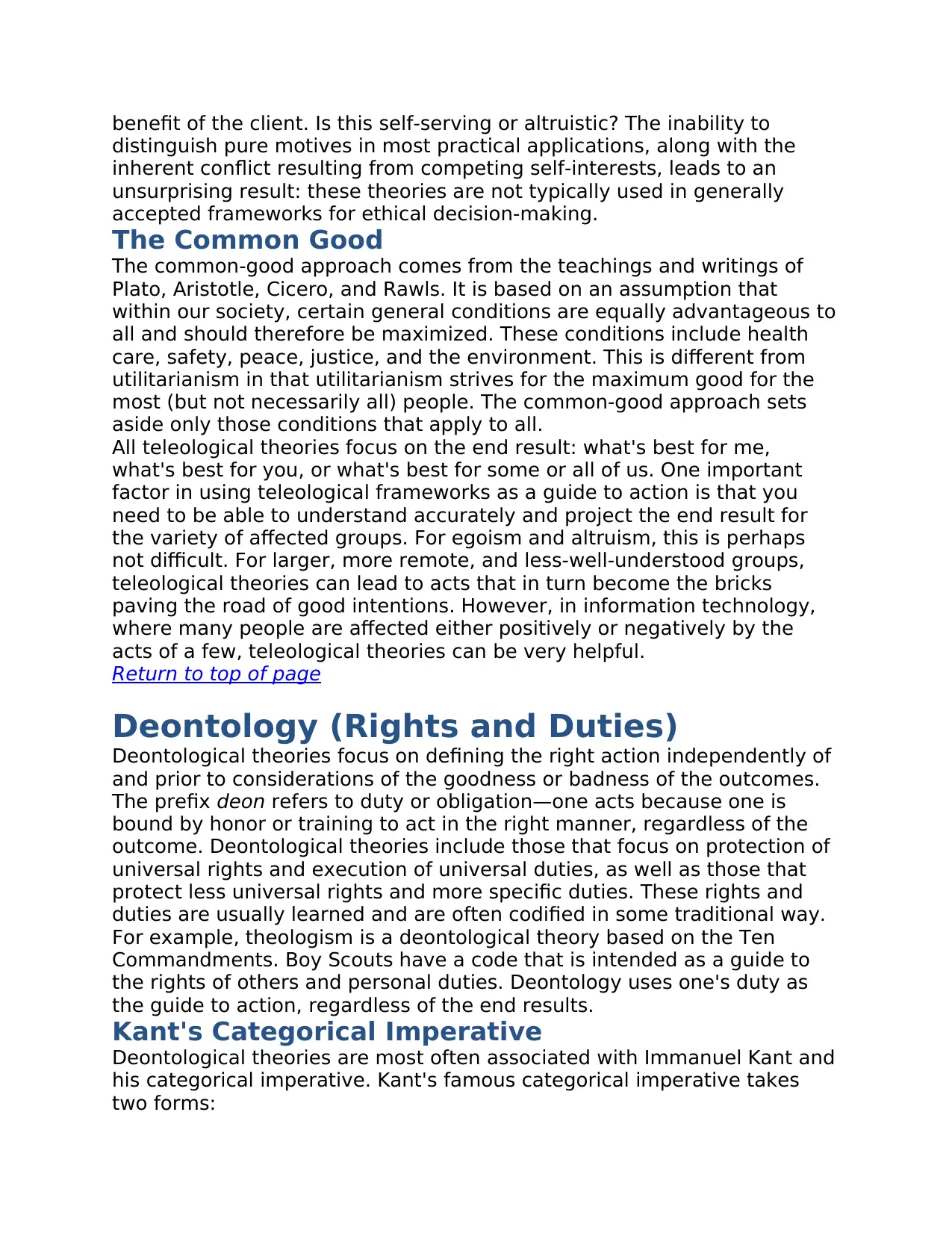
benefit of the client. Is this self-serving or altruistic? The inability to
distinguish pure motives in most practical applications, along with the
inherent conflict resulting from competing self-interests, leads to an
unsurprising result: these theories are not typically used in generally
accepted frameworks for ethical decision-making.
The Common Good
The common-good approach comes from the teachings and writings of
Plato, Aristotle, Cicero, and Rawls. It is based on an assumption that
within our society, certain general conditions are equally advantageous to
all and should therefore be maximized. These conditions include health
care, safety, peace, justice, and the environment. This is different from
utilitarianism in that utilitarianism strives for the maximum good for the
most (but not necessarily all) people. The common-good approach sets
aside only those conditions that apply to all.
All teleological theories focus on the end result: what's best for me,
what's best for you, or what's best for some or all of us. One important
factor in using teleological frameworks as a guide to action is that you
need to be able to understand accurately and project the end result for
the variety of affected groups. For egoism and altruism, this is perhaps
not difficult. For larger, more remote, and less-well-understood groups,
teleological theories can lead to acts that in turn become the bricks
paving the road of good intentions. However, in information technology,
where many people are affected either positively or negatively by the
acts of a few, teleological theories can be very helpful.
Return to top of page
Deontology (Rights and Duties)
Deontological theories focus on defining the right action independently of
and prior to considerations of the goodness or badness of the outcomes.
The prefix deon refers to duty or obligation—one acts because one is
bound by honor or training to act in the right manner, regardless of the
outcome. Deontological theories include those that focus on protection of
universal rights and execution of universal duties, as well as those that
protect less universal rights and more specific duties. These rights and
duties are usually learned and are often codified in some traditional way.
For example, theologism is a deontological theory based on the Ten
Commandments. Boy Scouts have a code that is intended as a guide to
the rights of others and personal duties. Deontology uses one's duty as
the guide to action, regardless of the end results.
Kant's Categorical Imperative
Deontological theories are most often associated with Immanuel Kant and
his categorical imperative. Kant's famous categorical imperative takes
two forms:
distinguish pure motives in most practical applications, along with the
inherent conflict resulting from competing self-interests, leads to an
unsurprising result: these theories are not typically used in generally
accepted frameworks for ethical decision-making.
The Common Good
The common-good approach comes from the teachings and writings of
Plato, Aristotle, Cicero, and Rawls. It is based on an assumption that
within our society, certain general conditions are equally advantageous to
all and should therefore be maximized. These conditions include health
care, safety, peace, justice, and the environment. This is different from
utilitarianism in that utilitarianism strives for the maximum good for the
most (but not necessarily all) people. The common-good approach sets
aside only those conditions that apply to all.
All teleological theories focus on the end result: what's best for me,
what's best for you, or what's best for some or all of us. One important
factor in using teleological frameworks as a guide to action is that you
need to be able to understand accurately and project the end result for
the variety of affected groups. For egoism and altruism, this is perhaps
not difficult. For larger, more remote, and less-well-understood groups,
teleological theories can lead to acts that in turn become the bricks
paving the road of good intentions. However, in information technology,
where many people are affected either positively or negatively by the
acts of a few, teleological theories can be very helpful.
Return to top of page
Deontology (Rights and Duties)
Deontological theories focus on defining the right action independently of
and prior to considerations of the goodness or badness of the outcomes.
The prefix deon refers to duty or obligation—one acts because one is
bound by honor or training to act in the right manner, regardless of the
outcome. Deontological theories include those that focus on protection of
universal rights and execution of universal duties, as well as those that
protect less universal rights and more specific duties. These rights and
duties are usually learned and are often codified in some traditional way.
For example, theologism is a deontological theory based on the Ten
Commandments. Boy Scouts have a code that is intended as a guide to
the rights of others and personal duties. Deontology uses one's duty as
the guide to action, regardless of the end results.
Kant's Categorical Imperative
Deontological theories are most often associated with Immanuel Kant and
his categorical imperative. Kant's famous categorical imperative takes
two forms:
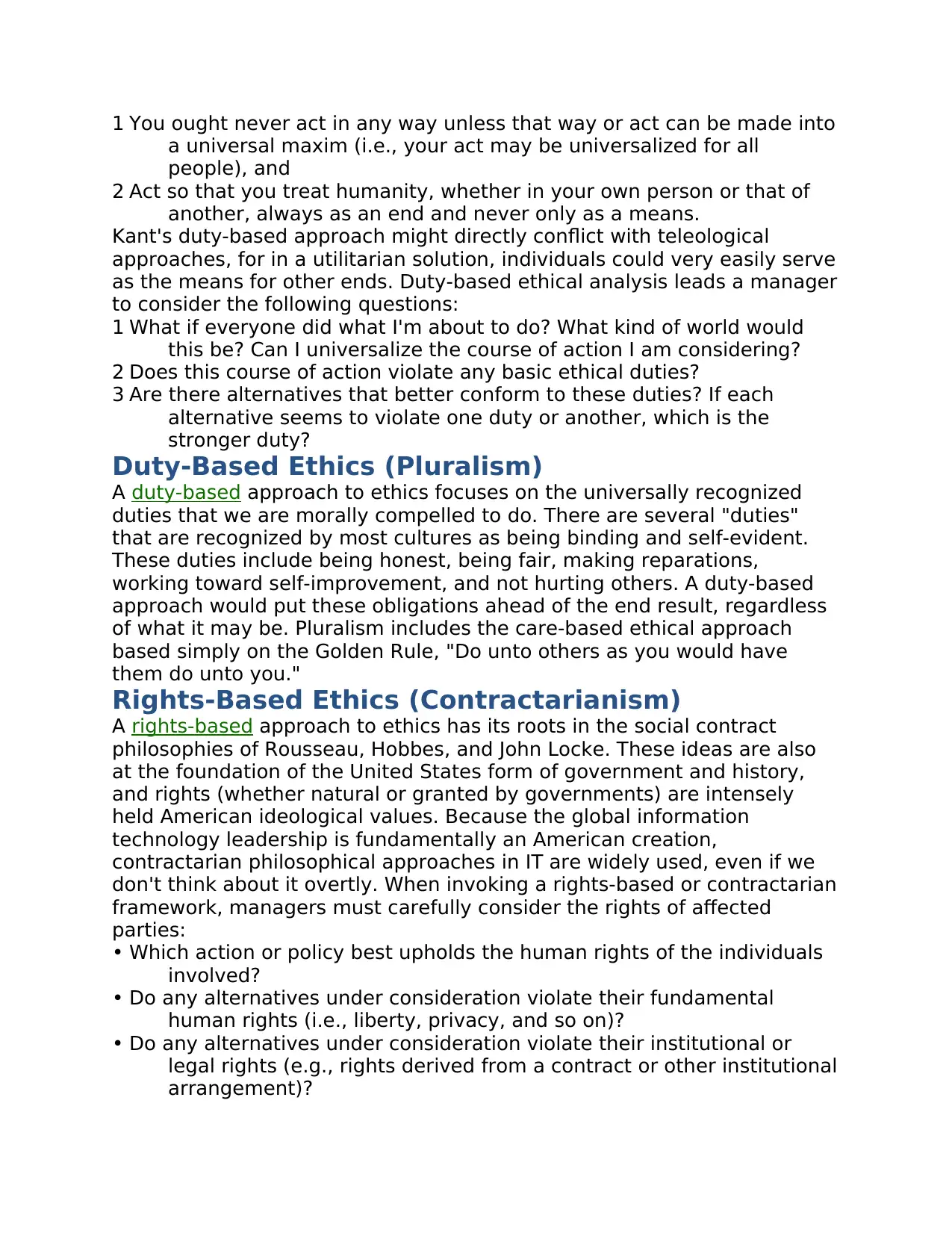
1 You ought never act in any way unless that way or act can be made into
a universal maxim (i.e., your act may be universalized for all
people), and
2 Act so that you treat humanity, whether in your own person or that of
another, always as an end and never only as a means.
Kant's duty-based approach might directly conflict with teleological
approaches, for in a utilitarian solution, individuals could very easily serve
as the means for other ends. Duty-based ethical analysis leads a manager
to consider the following questions:
1 What if everyone did what I'm about to do? What kind of world would
this be? Can I universalize the course of action I am considering?
2 Does this course of action violate any basic ethical duties?
3 Are there alternatives that better conform to these duties? If each
alternative seems to violate one duty or another, which is the
stronger duty?
Duty-Based Ethics (Pluralism)
A duty-based approach to ethics focuses on the universally recognized
duties that we are morally compelled to do. There are several "duties"
that are recognized by most cultures as being binding and self-evident.
These duties include being honest, being fair, making reparations,
working toward self-improvement, and not hurting others. A duty-based
approach would put these obligations ahead of the end result, regardless
of what it may be. Pluralism includes the care-based ethical approach
based simply on the Golden Rule, "Do unto others as you would have
them do unto you."
Rights-Based Ethics (Contractarianism)
A rights-based approach to ethics has its roots in the social contract
philosophies of Rousseau, Hobbes, and John Locke. These ideas are also
at the foundation of the United States form of government and history,
and rights (whether natural or granted by governments) are intensely
held American ideological values. Because the global information
technology leadership is fundamentally an American creation,
contractarian philosophical approaches in IT are widely used, even if we
don't think about it overtly. When invoking a rights-based or contractarian
framework, managers must carefully consider the rights of affected
parties:
• Which action or policy best upholds the human rights of the individuals
involved?
• Do any alternatives under consideration violate their fundamental
human rights (i.e., liberty, privacy, and so on)?
• Do any alternatives under consideration violate their institutional or
legal rights (e.g., rights derived from a contract or other institutional
arrangement)?
a universal maxim (i.e., your act may be universalized for all
people), and
2 Act so that you treat humanity, whether in your own person or that of
another, always as an end and never only as a means.
Kant's duty-based approach might directly conflict with teleological
approaches, for in a utilitarian solution, individuals could very easily serve
as the means for other ends. Duty-based ethical analysis leads a manager
to consider the following questions:
1 What if everyone did what I'm about to do? What kind of world would
this be? Can I universalize the course of action I am considering?
2 Does this course of action violate any basic ethical duties?
3 Are there alternatives that better conform to these duties? If each
alternative seems to violate one duty or another, which is the
stronger duty?
Duty-Based Ethics (Pluralism)
A duty-based approach to ethics focuses on the universally recognized
duties that we are morally compelled to do. There are several "duties"
that are recognized by most cultures as being binding and self-evident.
These duties include being honest, being fair, making reparations,
working toward self-improvement, and not hurting others. A duty-based
approach would put these obligations ahead of the end result, regardless
of what it may be. Pluralism includes the care-based ethical approach
based simply on the Golden Rule, "Do unto others as you would have
them do unto you."
Rights-Based Ethics (Contractarianism)
A rights-based approach to ethics has its roots in the social contract
philosophies of Rousseau, Hobbes, and John Locke. These ideas are also
at the foundation of the United States form of government and history,
and rights (whether natural or granted by governments) are intensely
held American ideological values. Because the global information
technology leadership is fundamentally an American creation,
contractarian philosophical approaches in IT are widely used, even if we
don't think about it overtly. When invoking a rights-based or contractarian
framework, managers must carefully consider the rights of affected
parties:
• Which action or policy best upholds the human rights of the individuals
involved?
• Do any alternatives under consideration violate their fundamental
human rights (i.e., liberty, privacy, and so on)?
• Do any alternatives under consideration violate their institutional or
legal rights (e.g., rights derived from a contract or other institutional
arrangement)?
⊘ This is a preview!⊘
Do you want full access?
Subscribe today to unlock all pages.

Trusted by 1+ million students worldwide
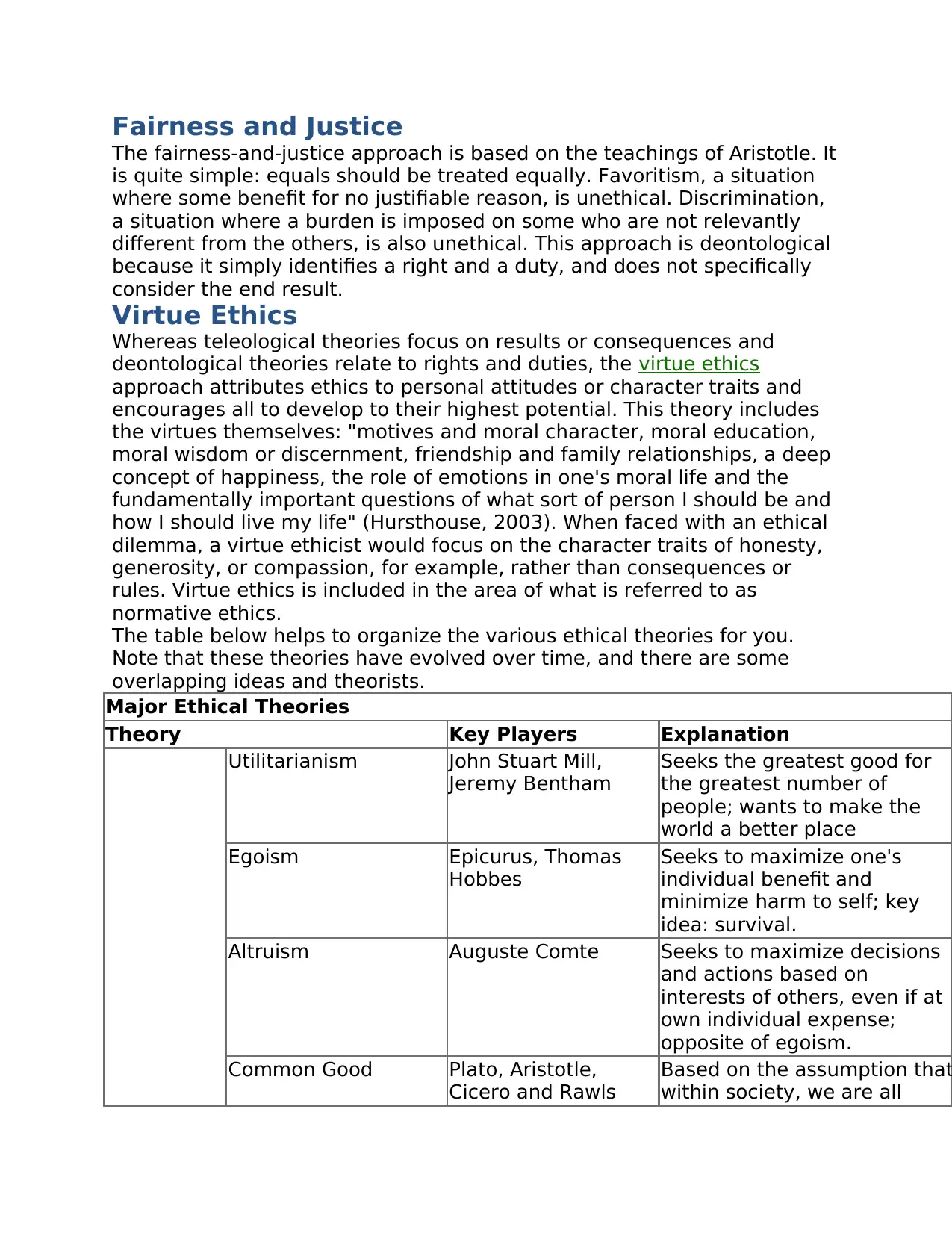
Fairness and Justice
The fairness-and-justice approach is based on the teachings of Aristotle. It
is quite simple: equals should be treated equally. Favoritism, a situation
where some benefit for no justifiable reason, is unethical. Discrimination,
a situation where a burden is imposed on some who are not relevantly
different from the others, is also unethical. This approach is deontological
because it simply identifies a right and a duty, and does not specifically
consider the end result.
Virtue Ethics
Whereas teleological theories focus on results or consequences and
deontological theories relate to rights and duties, the virtue ethics
approach attributes ethics to personal attitudes or character traits and
encourages all to develop to their highest potential. This theory includes
the virtues themselves: "motives and moral character, moral education,
moral wisdom or discernment, friendship and family relationships, a deep
concept of happiness, the role of emotions in one's moral life and the
fundamentally important questions of what sort of person I should be and
how I should live my life" (Hursthouse, 2003). When faced with an ethical
dilemma, a virtue ethicist would focus on the character traits of honesty,
generosity, or compassion, for example, rather than consequences or
rules. Virtue ethics is included in the area of what is referred to as
normative ethics.
The table below helps to organize the various ethical theories for you.
Note that these theories have evolved over time, and there are some
overlapping ideas and theorists.
Major Ethical Theories
Theory Key Players Explanation
Utilitarianism John Stuart Mill,
Jeremy Bentham
Seeks the greatest good for
the greatest number of
people; wants to make the
world a better place
Egoism Epicurus, Thomas
Hobbes
Seeks to maximize one's
individual benefit and
minimize harm to self; key
idea: survival.
Altruism Auguste Comte Seeks to maximize decisions
and actions based on
interests of others, even if at
own individual expense;
opposite of egoism.
Common Good Plato, Aristotle,
Cicero and Rawls
Based on the assumption that
within society, we are all
The fairness-and-justice approach is based on the teachings of Aristotle. It
is quite simple: equals should be treated equally. Favoritism, a situation
where some benefit for no justifiable reason, is unethical. Discrimination,
a situation where a burden is imposed on some who are not relevantly
different from the others, is also unethical. This approach is deontological
because it simply identifies a right and a duty, and does not specifically
consider the end result.
Virtue Ethics
Whereas teleological theories focus on results or consequences and
deontological theories relate to rights and duties, the virtue ethics
approach attributes ethics to personal attitudes or character traits and
encourages all to develop to their highest potential. This theory includes
the virtues themselves: "motives and moral character, moral education,
moral wisdom or discernment, friendship and family relationships, a deep
concept of happiness, the role of emotions in one's moral life and the
fundamentally important questions of what sort of person I should be and
how I should live my life" (Hursthouse, 2003). When faced with an ethical
dilemma, a virtue ethicist would focus on the character traits of honesty,
generosity, or compassion, for example, rather than consequences or
rules. Virtue ethics is included in the area of what is referred to as
normative ethics.
The table below helps to organize the various ethical theories for you.
Note that these theories have evolved over time, and there are some
overlapping ideas and theorists.
Major Ethical Theories
Theory Key Players Explanation
Utilitarianism John Stuart Mill,
Jeremy Bentham
Seeks the greatest good for
the greatest number of
people; wants to make the
world a better place
Egoism Epicurus, Thomas
Hobbes
Seeks to maximize one's
individual benefit and
minimize harm to self; key
idea: survival.
Altruism Auguste Comte Seeks to maximize decisions
and actions based on
interests of others, even if at
own individual expense;
opposite of egoism.
Common Good Plato, Aristotle,
Cicero and Rawls
Based on the assumption that
within society, we are all
Paraphrase This Document
Need a fresh take? Get an instant paraphrase of this document with our AI Paraphraser
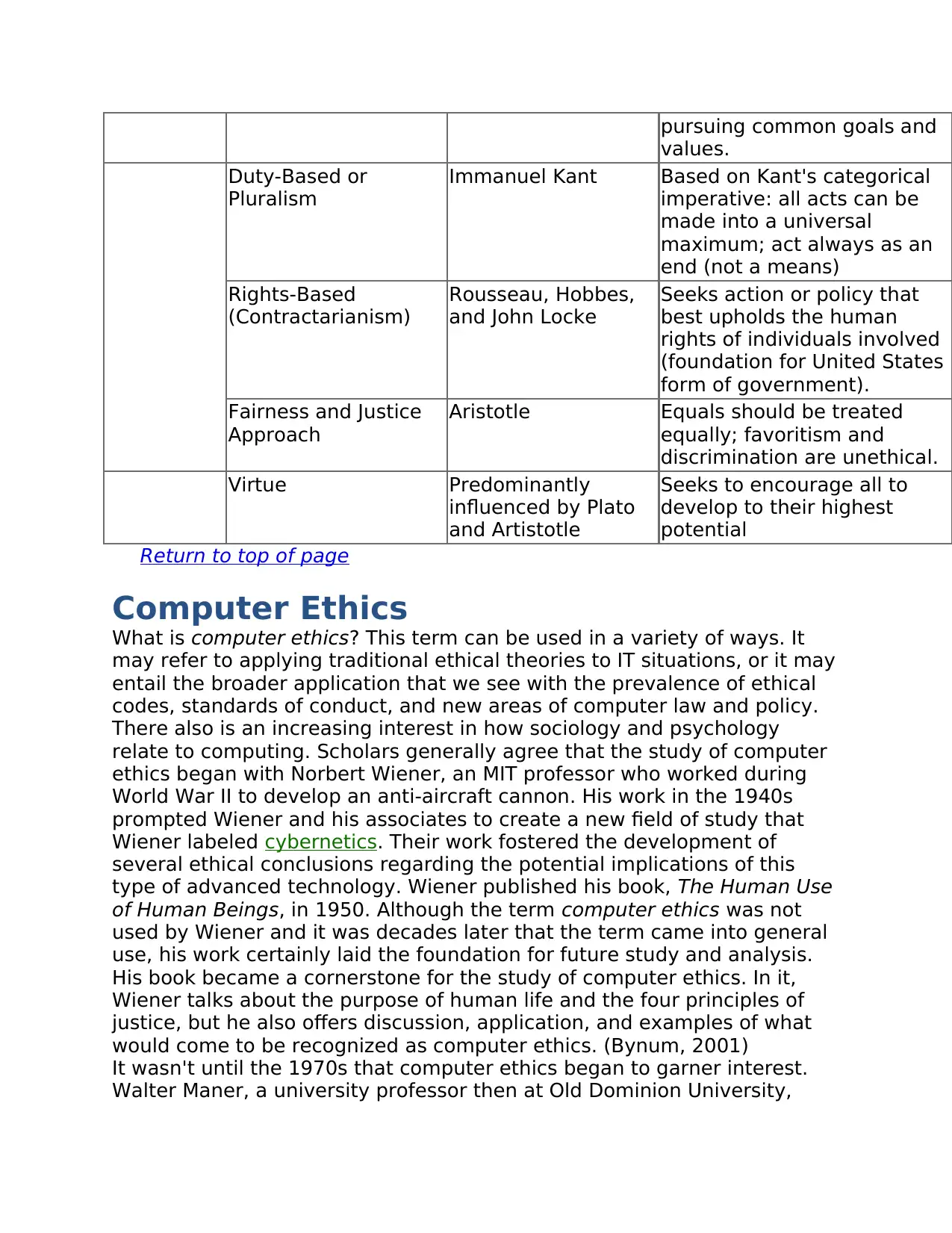
pursuing common goals and
values.
Duty-Based or
Pluralism
Immanuel Kant Based on Kant's categorical
imperative: all acts can be
made into a universal
maximum; act always as an
end (not a means)
Rights-Based
(Contractarianism)
Rousseau, Hobbes,
and John Locke
Seeks action or policy that
best upholds the human
rights of individuals involved
(foundation for United States
form of government).
Fairness and Justice
Approach
Aristotle Equals should be treated
equally; favoritism and
discrimination are unethical.
Virtue Predominantly
influenced by Plato
and Artistotle
Seeks to encourage all to
develop to their highest
potential
Return to top of page
Computer Ethics
What is computer ethics? This term can be used in a variety of ways. It
may refer to applying traditional ethical theories to IT situations, or it may
entail the broader application that we see with the prevalence of ethical
codes, standards of conduct, and new areas of computer law and policy.
There also is an increasing interest in how sociology and psychology
relate to computing. Scholars generally agree that the study of computer
ethics began with Norbert Wiener, an MIT professor who worked during
World War II to develop an anti-aircraft cannon. His work in the 1940s
prompted Wiener and his associates to create a new field of study that
Wiener labeled cybernetics. Their work fostered the development of
several ethical conclusions regarding the potential implications of this
type of advanced technology. Wiener published his book, The Human Use
of Human Beings, in 1950. Although the term computer ethics was not
used by Wiener and it was decades later that the term came into general
use, his work certainly laid the foundation for future study and analysis.
His book became a cornerstone for the study of computer ethics. In it,
Wiener talks about the purpose of human life and the four principles of
justice, but he also offers discussion, application, and examples of what
would come to be recognized as computer ethics. (Bynum, 2001)
It wasn't until the 1970s that computer ethics began to garner interest.
Walter Maner, a university professor then at Old Dominion University,
values.
Duty-Based or
Pluralism
Immanuel Kant Based on Kant's categorical
imperative: all acts can be
made into a universal
maximum; act always as an
end (not a means)
Rights-Based
(Contractarianism)
Rousseau, Hobbes,
and John Locke
Seeks action or policy that
best upholds the human
rights of individuals involved
(foundation for United States
form of government).
Fairness and Justice
Approach
Aristotle Equals should be treated
equally; favoritism and
discrimination are unethical.
Virtue Predominantly
influenced by Plato
and Artistotle
Seeks to encourage all to
develop to their highest
potential
Return to top of page
Computer Ethics
What is computer ethics? This term can be used in a variety of ways. It
may refer to applying traditional ethical theories to IT situations, or it may
entail the broader application that we see with the prevalence of ethical
codes, standards of conduct, and new areas of computer law and policy.
There also is an increasing interest in how sociology and psychology
relate to computing. Scholars generally agree that the study of computer
ethics began with Norbert Wiener, an MIT professor who worked during
World War II to develop an anti-aircraft cannon. His work in the 1940s
prompted Wiener and his associates to create a new field of study that
Wiener labeled cybernetics. Their work fostered the development of
several ethical conclusions regarding the potential implications of this
type of advanced technology. Wiener published his book, The Human Use
of Human Beings, in 1950. Although the term computer ethics was not
used by Wiener and it was decades later that the term came into general
use, his work certainly laid the foundation for future study and analysis.
His book became a cornerstone for the study of computer ethics. In it,
Wiener talks about the purpose of human life and the four principles of
justice, but he also offers discussion, application, and examples of what
would come to be recognized as computer ethics. (Bynum, 2001)
It wasn't until the 1970s that computer ethics began to garner interest.
Walter Maner, a university professor then at Old Dominion University,
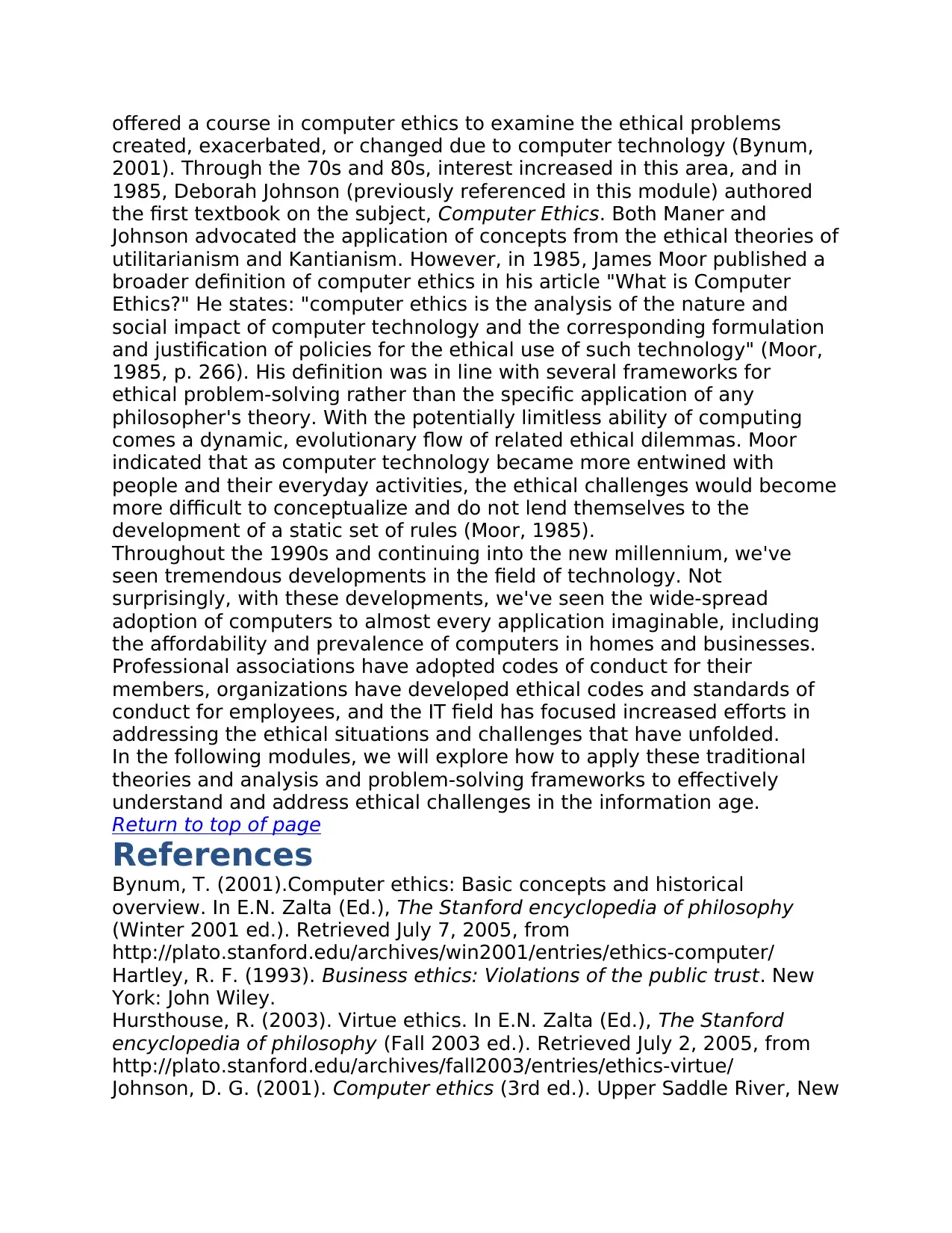
offered a course in computer ethics to examine the ethical problems
created, exacerbated, or changed due to computer technology (Bynum,
2001). Through the 70s and 80s, interest increased in this area, and in
1985, Deborah Johnson (previously referenced in this module) authored
the first textbook on the subject, Computer Ethics. Both Maner and
Johnson advocated the application of concepts from the ethical theories of
utilitarianism and Kantianism. However, in 1985, James Moor published a
broader definition of computer ethics in his article "What is Computer
Ethics?" He states: "computer ethics is the analysis of the nature and
social impact of computer technology and the corresponding formulation
and justification of policies for the ethical use of such technology" (Moor,
1985, p. 266). His definition was in line with several frameworks for
ethical problem-solving rather than the specific application of any
philosopher's theory. With the potentially limitless ability of computing
comes a dynamic, evolutionary flow of related ethical dilemmas. Moor
indicated that as computer technology became more entwined with
people and their everyday activities, the ethical challenges would become
more difficult to conceptualize and do not lend themselves to the
development of a static set of rules (Moor, 1985).
Throughout the 1990s and continuing into the new millennium, we've
seen tremendous developments in the field of technology. Not
surprisingly, with these developments, we've seen the wide-spread
adoption of computers to almost every application imaginable, including
the affordability and prevalence of computers in homes and businesses.
Professional associations have adopted codes of conduct for their
members, organizations have developed ethical codes and standards of
conduct for employees, and the IT field has focused increased efforts in
addressing the ethical situations and challenges that have unfolded.
In the following modules, we will explore how to apply these traditional
theories and analysis and problem-solving frameworks to effectively
understand and address ethical challenges in the information age.
Return to top of page
References
Bynum, T. (2001).Computer ethics: Basic concepts and historical
overview. In E.N. Zalta (Ed.), The Stanford encyclopedia of philosophy
(Winter 2001 ed.). Retrieved July 7, 2005, from
http://plato.stanford.edu/archives/win2001/entries/ethics-computer/
Hartley, R. F. (1993). Business ethics: Violations of the public trust. New
York: John Wiley.
Hursthouse, R. (2003). Virtue ethics. In E.N. Zalta (Ed.), The Stanford
encyclopedia of philosophy (Fall 2003 ed.). Retrieved July 2, 2005, from
http://plato.stanford.edu/archives/fall2003/entries/ethics-virtue/
Johnson, D. G. (2001). Computer ethics (3rd ed.). Upper Saddle River, New
created, exacerbated, or changed due to computer technology (Bynum,
2001). Through the 70s and 80s, interest increased in this area, and in
1985, Deborah Johnson (previously referenced in this module) authored
the first textbook on the subject, Computer Ethics. Both Maner and
Johnson advocated the application of concepts from the ethical theories of
utilitarianism and Kantianism. However, in 1985, James Moor published a
broader definition of computer ethics in his article "What is Computer
Ethics?" He states: "computer ethics is the analysis of the nature and
social impact of computer technology and the corresponding formulation
and justification of policies for the ethical use of such technology" (Moor,
1985, p. 266). His definition was in line with several frameworks for
ethical problem-solving rather than the specific application of any
philosopher's theory. With the potentially limitless ability of computing
comes a dynamic, evolutionary flow of related ethical dilemmas. Moor
indicated that as computer technology became more entwined with
people and their everyday activities, the ethical challenges would become
more difficult to conceptualize and do not lend themselves to the
development of a static set of rules (Moor, 1985).
Throughout the 1990s and continuing into the new millennium, we've
seen tremendous developments in the field of technology. Not
surprisingly, with these developments, we've seen the wide-spread
adoption of computers to almost every application imaginable, including
the affordability and prevalence of computers in homes and businesses.
Professional associations have adopted codes of conduct for their
members, organizations have developed ethical codes and standards of
conduct for employees, and the IT field has focused increased efforts in
addressing the ethical situations and challenges that have unfolded.
In the following modules, we will explore how to apply these traditional
theories and analysis and problem-solving frameworks to effectively
understand and address ethical challenges in the information age.
Return to top of page
References
Bynum, T. (2001).Computer ethics: Basic concepts and historical
overview. In E.N. Zalta (Ed.), The Stanford encyclopedia of philosophy
(Winter 2001 ed.). Retrieved July 7, 2005, from
http://plato.stanford.edu/archives/win2001/entries/ethics-computer/
Hartley, R. F. (1993). Business ethics: Violations of the public trust. New
York: John Wiley.
Hursthouse, R. (2003). Virtue ethics. In E.N. Zalta (Ed.), The Stanford
encyclopedia of philosophy (Fall 2003 ed.). Retrieved July 2, 2005, from
http://plato.stanford.edu/archives/fall2003/entries/ethics-virtue/
Johnson, D. G. (2001). Computer ethics (3rd ed.). Upper Saddle River, New
⊘ This is a preview!⊘
Do you want full access?
Subscribe today to unlock all pages.

Trusted by 1+ million students worldwide

Jersey: Prentice Hall.
Kidder, R. M. (1995). How good people make tough choices: Resolving the
dilemmas of ethical living. New York: Simon and Schuster.
Narvan, F. Ask the expert: What is the difference between ethics, morals
and values? The Ethics Resource Center. Retrieved June 19, 2005, from
http://www.ethics.org/ask_e4.html
Williams, B. (1993). A critique of utilitarianism. In J.J.C. Smart & B.
Williams (Eds.), Utilitarianism: For and against. Cambridge: Cambridge
University Press.
Return to top of page
Kidder, R. M. (1995). How good people make tough choices: Resolving the
dilemmas of ethical living. New York: Simon and Schuster.
Narvan, F. Ask the expert: What is the difference between ethics, morals
and values? The Ethics Resource Center. Retrieved June 19, 2005, from
http://www.ethics.org/ask_e4.html
Williams, B. (1993). A critique of utilitarianism. In J.J.C. Smart & B.
Williams (Eds.), Utilitarianism: For and against. Cambridge: Cambridge
University Press.
Return to top of page
1 out of 10
Related Documents
Your All-in-One AI-Powered Toolkit for Academic Success.
+13062052269
info@desklib.com
Available 24*7 on WhatsApp / Email
![[object Object]](/_next/static/media/star-bottom.7253800d.svg)
Unlock your academic potential
Copyright © 2020–2026 A2Z Services. All Rights Reserved. Developed and managed by ZUCOL.





